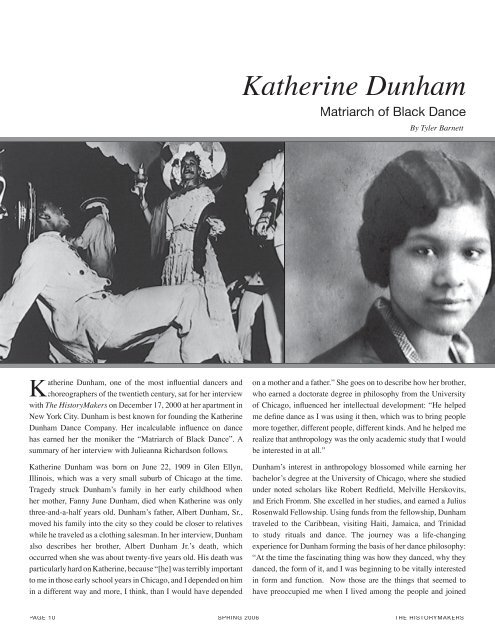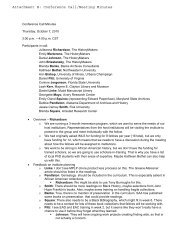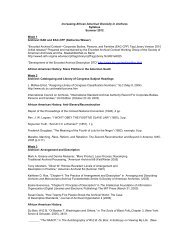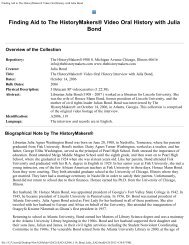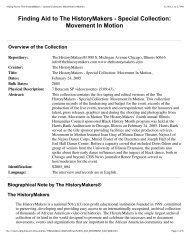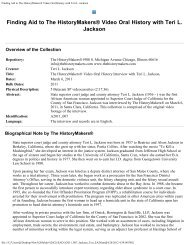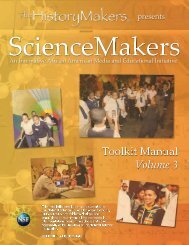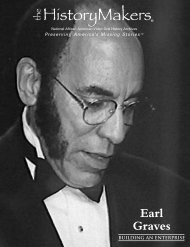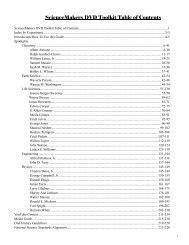Katherine Dunham - The HistoryMakers
Katherine Dunham - The HistoryMakers
Katherine Dunham - The HistoryMakers
Create successful ePaper yourself
Turn your PDF publications into a flip-book with our unique Google optimized e-Paper software.
<strong>Katherine</strong> <strong>Dunham</strong><br />
Matriarch of Black Dance<br />
By Tyler Barnett<br />
<strong>Katherine</strong> <strong>Dunham</strong>, one of the most influential dancers and<br />
choreographers of the twentieth century, sat for her interview<br />
with <strong>The</strong> <strong>HistoryMakers</strong> on December 17, 2000 at her apartment in<br />
New York City. <strong>Dunham</strong> is best known for founding the <strong>Katherine</strong><br />
<strong>Dunham</strong> Dance Company. Her incalculable influence on dance<br />
has earned her the moniker the “Matriarch of Black Dance”. A<br />
summary of her interview with Julieanna Richardson follows.<br />
<strong>Katherine</strong> <strong>Dunham</strong> was born on June 22, 1909 in Glen Ellyn,<br />
Illinois, which was a very small suburb of Chicago at the time.<br />
Tragedy struck <strong>Dunham</strong>’s family in her early childhood when<br />
her mother, Fanny June <strong>Dunham</strong>, died when <strong>Katherine</strong> was only<br />
three-and-a-half years old. <strong>Dunham</strong>’s father, Albert <strong>Dunham</strong>, Sr.,<br />
moved his family into the city so they could be closer to relatives<br />
while he traveled as a clothing salesman. In her interview, <strong>Dunham</strong><br />
also describes her brother, Albert <strong>Dunham</strong> Jr.’s death, which<br />
occurred when she was about twenty-five years old. His death was<br />
particularly hard on <strong>Katherine</strong>, because “[he] was terribly important<br />
to me in those early school years in Chicago, and I depended on him<br />
in a different way and more, I think, than I would have depended<br />
on a mother and a father.” She goes on to describe how her brother,<br />
who earned a doctorate degree in philosophy from the University<br />
of Chicago, influenced her intellectual development: “He helped<br />
me define dance as I was using it then, which was to bring people<br />
more together, different people, different kinds. And he helped me<br />
realize that anthropology was the only academic study that I would<br />
be interested in at all.”<br />
<strong>Dunham</strong>’s interest in anthropology blossomed while earning her<br />
bachelor’s degree at the University of Chicago, where she studied<br />
under noted scholars like Robert Redfield, Melville Herskovits,<br />
and Erich Fromm. She excelled in her studies, and earned a Julius<br />
Rosenwald Fellowship. Using funds from the fellowship, <strong>Dunham</strong><br />
traveled to the Caribbean, visiting Haiti, Jamaica, and Trinidad<br />
to study rituals and dance. <strong>The</strong> journey was a life-changing<br />
experience for <strong>Dunham</strong> forming the basis of her dance philosophy:<br />
“At the time the fascinating thing was how they danced, why they<br />
danced, the form of it, and I was beginning to be vitally interested<br />
in form and function. Now those are the things that seemed to<br />
have preoccupied me when I lived among the people and joined<br />
PAGE 10 SPRING 2006 THE HISTORYMAKERS


